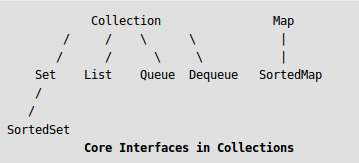List 是 Collection 的子接口。它是一个有序的对象集合,其中可以存储重复的值。由于 List 保留插入顺序,因此它允许位置访问和插入元素。列表接口由 ArrayList 、 LinkedList 、 Vector 和 Stack 类实现。
Map接口表示键和值之间的映射。 Map 接口不是 Map 接口的子类型集合接口。因此它的行为与其他集合类型有点不同。

例子:
Input: List : [1="1", 2="2", 3="3"]
Output: Map : {1=1, 2=2, 3=3}
Input: List : [1="Geeks", 2="for", 3="Geeks"]
Output: Map : {1=Geeks, 2=for, 3=Geeks}
下面是在 Java 中将 List 转换为 Map 的多种方法。为此,假设 List 的每个元素都有一个标识符,该标识符将用作结果 Map 中的键。
- 按列表对象使用:
方法:
- 获取要转换为Map的List
- 创建一个空Map
- 迭代列表中的项目并将每个项目添加到 Map 中。
- 返回形成的Map
// Java program for list convert in map // with the help of Object method import java.util.ArrayList; import java.util.List; import java.util.Map; import java.util.HashMap; // create a list class Student { // id will act as Key private Integer id; // name will act as value private String name; // create curstuctor for reference public Student(Integer id, String name) { // assign the value of id and name this.id = id; this.name = name; } // return private variable id public Integer getId() { return id; } // return private variable name public String getName() { return name; } } // main class and method public class GFG { // main Driver public static void main(String[] args) { // create a list List<Student> lt = new ArrayList<Student>(); // add the member of list lt.add(new Student(1, "Geeks")); lt.add(new Student(2, "For")); lt.add(new Student(3, "Geeks")); // create map with the help of // Object (stu) method // create object of Map class Map<Integer, String> map = new HashMap<>(); // put every value list to Map for (Student stu : lt) { map.put(stu.getId(), stu.getName()); } // print map System.out.println("Map : " + map); } }输出:Map : {1=Geeks, 2=For, 3=Geeks} - 使用 Collectors.toMap() 方法:此方法包括创建学生对象列表,并使用 Collectors.toMap() 将其转换为 Map。
Approach:- 获取要转换为Map的List
- 使用List.stream()方法将List转换为流
- 借助 Collectors.toMap() 方法创建Map
- 使用stream.collect()方法收集形成的Map
- 返回形成的Map
// Java program for list convert in map // with the help of Collectors.toMap() method import java.util.ArrayList; import java.util.LinkedHashMap; import java.util.List; import java.util.stream.Collectors; // create a list class Student { // id will act as Key private Integer id; // name will act as value private String name; // create curstuctor for reference public Student(Integer id, String name) { // assign the value of id and name this.id = id; this.name = name; } // return private variable id public Integer getId() { return id; } // return private variable name public String getName() { return name; } } // main class and method public class GFG { // main Driver public static void main(String[] args) { // create a list List<Student> lt = new ArrayList<>(); // add the member of list lt.add(new Student(1, "Geeks")); lt.add(new Student(2, "For")); lt.add(new Student(3, "Geeks")); // create map with the help of // Collectors.toMap() method LinkedHashMap<Integer, String> map = lt.stream() .collect( Collectors .toMap( Student::getId, Student::getName, (x, y) -> x + ", " + y, LinkedHashMap::new)); // print map map.forEach( (x, y) -> System.out.println(x + "=" + y)); } }输出:1=Geeks 2=For 3=Geeks
- 使用Collector创建MultiMap。groupingBy():
方法:
- 获取要转换为Map的List
- 使用List.stream()方法将List转换为流
- 借助 Collectors.groupingBy() 方法创建Map
- 使用stream.collect()方法收集形成的Map
- 返回形成的Map
// Java program for list convert in map // with the help of Collectors.groupingBy() method import java.util.*; import java.util.stream.Collectors; // create a list class Student { // id will act as Key private Integer id; // name will act as value private String name; // create curstuctor for reference public Student(Integer id, String name) { // assign the value of id and name this.id = id; this.name = name; } // return private variable id public Integer getId() { return id; } // return private variable name public String getName() { return name; } } // main class and method public class GFG { // main Driver public static void main(String[] args) { // create a list List<Student> lt = new ArrayList<Student>(); // add the member of list lt.add(new Student(1, "Geeks")); lt.add(new Student(1, "For")); lt.add(new Student(2, "Geeks")); lt.add(new Student(2, "GeeksForGeeks")); // create map with the help of // Object (stu) method // create object of Multi Map class // create multimap and store the value of list Map<Integer, List<String> > multimap = lt .stream() .collect( Collectors .groupingBy( Student::getId, Collectors .mapping( Student::getName, Collectors .toList()))); // print the multiMap System.out.println("MultiMap = " + multimap); } }输出:MultiMap = {1=[Geeks, For], 2=[Geeks, GeeksForGeeks]}
相关用法
- Java List转HashSet用法及代码示例
- Java List转Set用法及代码示例
- Java List转Stream用法及代码示例
- Java List sort()用法及代码示例
- Java List spliterator()用法及代码示例
- Java List toArray()用法及代码示例
- Java ListIterator add()用法及代码示例
- Java ListIterator hasNext()用法及代码示例
- Java ListIterator hasPrevious()用法及代码示例
- Java ListIterator next()用法及代码示例
- Java ListIterator nextIndex()用法及代码示例
- Java ListIterator previous()用法及代码示例
- Java ListIterator previousIndex()用法及代码示例
- Java ListIterator remove()用法及代码示例
- Java ListIterator set()用法及代码示例
- Java ListResourceBundle getContents()用法及代码示例
- Java ListResourceBundle getKeys()用法及代码示例
- Java ListResourceBundle handleGetObject()用法及代码示例
- Java ListResourceBundle handleKeySet()用法及代码示例
- Java List add()用法及代码示例
- Java List addAll()用法及代码示例
- Java List clear()用法及代码示例
- Java List contains()用法及代码示例
- Java List containsAll()用法及代码示例
- Java List equals()用法及代码示例
注:本文由纯净天空筛选整理自Rajput-Ji大神的英文原创作品 Program to Convert List to Map in Java。非经特殊声明,原始代码版权归原作者所有,本译文未经允许或授权,请勿转载或复制。
